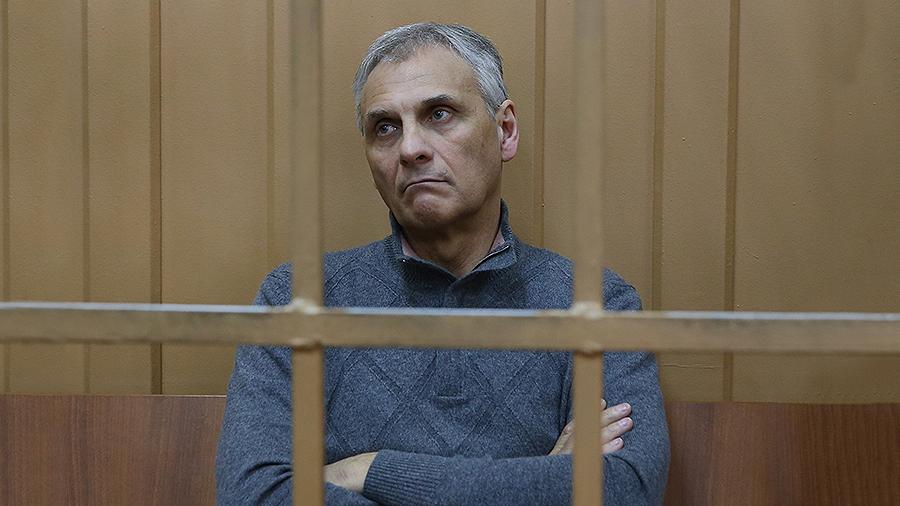
Address of the reception office of the Investigative Committee: Moscow, ul. Pervaya Frunzenskaya, d 3a
Address for writtent applications: 105005, Moscow, Tekhnichesky Pereulok, 2
Address of the reception office of the Investigative Committee: Moscow, ul. Pervaya Frunzenskaya, d 3a
Address for writtent applications: 105005, Moscow, Tekhnichesky Pereulok, 2

The evidence gathered by the Main Directorate on Major Crimes Investigation of the Investigative Committee of Russia was found by the court to be sufficient to convict former Sakhalin Region Governor Alexander Khoroshavin, Sakhalin Region Deputy Governor Sergey Karepkin, aide to the Sakhalin Region Governor Andrey Ikramov, and Sakhalin Region Minister of Agriculture, Trade and Food Nikolay Borisov. They were found guilty of the offences under Part 6 of Article 290, and Article 174.1 of the Criminal Code of Russia, that is, of bribe-taking and legalization of monetary funds acquired as a result of offences committed by them.
The investigation and the court established that, in 2010, Sakhalin Region Governor Alexander Khoroshavin had created an organized criminal group featuring Sakhalin Region Deputy Governor Sergey Karepkin and aide to the Sakhalin Region Governor Andrey Ikramov. Borisov had been involved in one of the offences. From 2010 to 2015, members of the organized group led by Khoroshavin and comprising a number of entrepreneurs operating in animal husbandry, transportation, and construction, had been receiving bribes for their general protection, performance of activities falling within the authority of the members of the organized group, and promotion of such activities by officials of the Sakhalin Region’s executive authorities. The bribes’ total had exceeded 500 million rubles.
For instance, from 2011 to 2013, Khoroshavin and Ikramov had been systematically receiving bribes from an entrepreneur for timely payment of works under the state contract for the construction of an energy facility in the region. At the same time, the entrepreneur had been instructed by Khoroshavin to transfer funds to accounts of legal entities opened with non-resident banks located in the offshore zone. Ikramov’s role had been to pass on Khoroshavin’s claims to the entrepreneur, and also to ensure that money would be brought into Russia and received directly in cash. In total, the accomplices had gained about 170 million rubles during this period. In 2012-2015, Khoroshavin had received 30 million rubles from an airline’s owner for his general patronage and other government support measures.
In 2013-2014, Khoroshavin and his associates had been given 85 million rubles as bribes by an entrepreneur who had been involved in the construction of roads in Sakhalin Region under a state contract. The sum of bribes had amounted to 6 percent of the price of the state contract. In another episode, an entrepreneur building an educational institution in Yuzhno-Sakhalinsk had been forced to give 10 percent of the allocated budget to the accused as bribes. At the same time, in 2013-2015, Khoroshavin had illegally received 125 million rubles. The defendants had also guaranteed support of the region in the allocation of legal subsidies for the construction of a livestock breeding complex. However, after the entrepreneur had invested a significant amount of his own money in the construction, he had been placed under de facto enslaving conditions--a bribe had been demanded from him to receive a legal subsidy. In 2011-2014, Khoroshavin had been given a bribe of 66 million rubles for patronage during the construction of a sports facility at the expense of the budget. Moreover, during this period, he had received a bribe of 19 million rubles for his influence on an entrepreneur who had been engaged in road construction, in the conclusion of a subcontract with another entrepreneur. In 2014, the defendant and his accomplices had forced an entrepreneur to sell apartments for the needs of physicians to the regional administration at an underestimated cost, while he had received a bribe in the amount of 10 million rubles for general protection.
After receiving bribes, Khoroshavin had legalized a part of them in the amount of over 77 million rubles by crediting them to bank cards and carrying out operations to purchase foreign currency.
The investigators found that part of Khoroshavin’s property was not declared in the manner prescribed by law. At the request of the investigation, the court arrested a significant number of expensive cars, real estate, valuables, and money. Subsequently, the court ruled to transfer all of these assets to the state’s income under anti-corruption legislation, following a suit filed by the Deputy Prosecutor General of the Russian Federation. Among these assets were four apartments worth over 240 million rubles, six car places worth over 2.9 million rubles, six cars worth at least 42.3 million rubles, including, for example, Mercedes-Benz worth 11 million rubles, Bentley Continental GT and Bentley Mulsan worth more than 23.3 million rubles, and two Lexus, valued at least 6 million rubles. The state also received as income a residential house, non-residential premises, land plots, funds in rubles and foreign currency worth more than 700 million rubles, jewelry, and other valuables.
The investigation showed that Khoroshavin loved expensive accessories. Apparently, the Governor’s greatest need was for expensive watches. His collection included 195 pieces worth a total of 602 million rubles. The most expensive of them cost $700,000. In fact, the investigators learned that shortly before his arrest Khoroshavin had ordered another watch worth more than 36 million rubles.
The court sentenced Khoroshavin to 13 years of imprisonment and a fine of 500 million rubles, Andrey Ikramov to 9.5 years of imprisonment and a fine of 171 million rubles, Sergey Karepkin to 8 years of imprisonment and a fine of 4 million rubles, and Nikolay Borisov to 2.5 million rubles of fine, taking into account the period of time he served under house arrest.
Official spokesperson for the Investigative Committee of Russia S. Petrenko